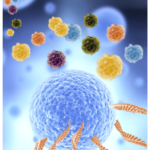Lien vers Pubmed [PMID] – 34800432
Lien DOI – S0091-6749(21)01761-910.1016/j.jaci.2021.11.004
J Allergy Clin Immunol 2021 Nov; ():
Severe coronavirus disease 2019 (COVID-19) is characterized by impaired type I interferon activity and a state of hyperinflammation leading to acute respiratory distress syndrome. The complement system has recently emerged as a key player in triggering and maintaining the inflammatory state, but the role of this molecular cascade in severe COVID-19 is still poorly characterized.We aimed at assessing the contribution of complement pathways at both the protein and transcriptomic levels.To this end, we systematically assessed the RNA levels of 28 complement genes in the circulating whole blood of patients with COVID-19 and healthy controls, including genes of the alternative pathway, for which data remain scarce.We found differential expression of genes involved in the complement system, yet with various expression patterns: whereas patients displaying moderate disease had elevated expression of classical pathway genes, severe disease was associated with increased lectin and alternative pathway activation, which correlated with inflammation and coagulopathy markers. Additionally, properdin, a pivotal positive regulator of the alternative pathway, showed high RNA expression but was found at low protein concentrations in patients with a severe and critical disease, suggesting its deposition at the sites of complement activation. Notably, low properdin levels were significantly associated with the use of mechanical ventilation (area under the curve = 0.82; P = .002).This study sheds light on the role of the alternative pathway in severe COVID-19 and provides additional rationale for the testing of drugs inhibiting the alternative pathway of the complement system.




